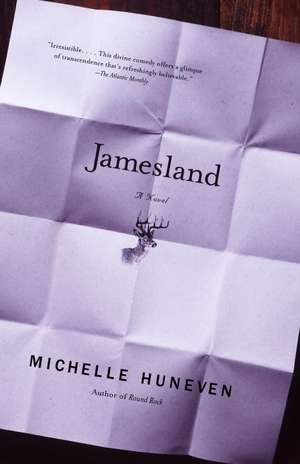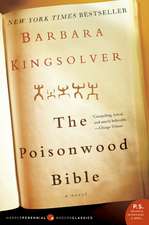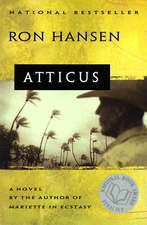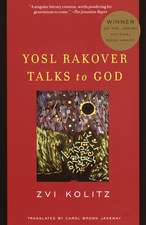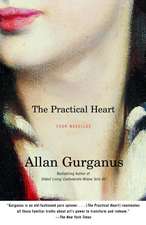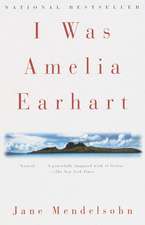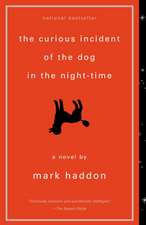Jamesland: Vintage Contemporaries
Autor Michelle Hunevenen Limba Engleză Paperback – 31 aug 2004
Vezi toate premiile Carte premiată
L.A. Times Book Prize (2003)
When thirty-three-year-old Alice Black discovers a deer in her dining room after fighting with her boyfriend, she wonders if she’s going crazy. Pete Ross, forty-six, knows he’s crazy. He’s wrecked his marriage, slashed his wrists, and done time in a psychiatric institution, and now he's being cared for by his mother, who’s a nun. Forty-five-year-old Helen Harland, a spirited Unitarian Universalist minister, is being driven crazy by her hostile church administration. Living in Los Feliz, California, the three meet at Helen’s Wednesday midweek services. Though initially incompatible, the sheer force of Helen’s idiosyncratic ministering (her “variety show of religious experience”)–paired with Alice’s illustrious ancestor William James–proves to be a catalyst for friendship and a kind of transcendence. Generous and compassionate, Michelle Huneven delivers a joyful new novel about love, faith, and a few wayward souls waiting for life to begin.
Din seria Vintage Contemporaries
-
 Preț: 130.17 lei
Preț: 130.17 lei -
 Preț: 99.72 lei
Preț: 99.72 lei -
 Preț: 117.42 lei
Preț: 117.42 lei -
 Preț: 105.26 lei
Preț: 105.26 lei -
 Preț: 98.30 lei
Preț: 98.30 lei -
 Preț: 88.79 lei
Preț: 88.79 lei -
 Preț: 109.25 lei
Preț: 109.25 lei -
 Preț: 109.49 lei
Preț: 109.49 lei -
 Preț: 103.66 lei
Preț: 103.66 lei -
 Preț: 89.91 lei
Preț: 89.91 lei -
 Preț: 109.64 lei
Preț: 109.64 lei -
 Preț: 115.49 lei
Preț: 115.49 lei -
 Preț: 113.58 lei
Preț: 113.58 lei -
 Preț: 111.25 lei
Preț: 111.25 lei -
 Preț: 99.50 lei
Preț: 99.50 lei -
 Preț: 105.89 lei
Preț: 105.89 lei -
 Preț: 113.07 lei
Preț: 113.07 lei -
 Preț: 103.88 lei
Preț: 103.88 lei -
 Preț: 86.07 lei
Preț: 86.07 lei -
 Preț: 109.83 lei
Preț: 109.83 lei -
 Preț: 95.18 lei
Preț: 95.18 lei -
 Preț: 97.90 lei
Preț: 97.90 lei -
 Preț: 94.96 lei
Preț: 94.96 lei -
 Preț: 97.28 lei
Preț: 97.28 lei -
 Preț: 101.99 lei
Preț: 101.99 lei -
 Preț: 98.92 lei
Preț: 98.92 lei -
 Preț: 98.70 lei
Preț: 98.70 lei -
 Preț: 87.36 lei
Preț: 87.36 lei -
 Preț: 99.11 lei
Preț: 99.11 lei -
 Preț: 99.18 lei
Preț: 99.18 lei -
 Preț: 122.59 lei
Preț: 122.59 lei -
 Preț: 87.68 lei
Preț: 87.68 lei -
 Preț: 91.64 lei
Preț: 91.64 lei -
 Preț: 136.77 lei
Preț: 136.77 lei -
 Preț: 88.50 lei
Preț: 88.50 lei -
 Preț: 104.29 lei
Preț: 104.29 lei -
 Preț: 99.80 lei
Preț: 99.80 lei -
 Preț: 105.70 lei
Preț: 105.70 lei -
 Preț: 75.45 lei
Preț: 75.45 lei -
 Preț: 95.58 lei
Preț: 95.58 lei -
 Preț: 93.98 lei
Preț: 93.98 lei -
 Preț: 82.23 lei
Preț: 82.23 lei -
 Preț: 94.55 lei
Preț: 94.55 lei -
 Preț: 126.42 lei
Preț: 126.42 lei -
 Preț: 111.44 lei
Preț: 111.44 lei -
 Preț: 103.88 lei
Preț: 103.88 lei -
 Preț: 103.36 lei
Preț: 103.36 lei -
 Preț: 98.52 lei
Preț: 98.52 lei -
 Preț: 97.72 lei
Preț: 97.72 lei
Preț: 122.66 lei
Nou
Puncte Express: 184
Preț estimativ în valută:
23.47€ • 24.38$ • 19.50£
23.47€ • 24.38$ • 19.50£
Carte disponibilă
Livrare economică 13-27 ianuarie 25
Preluare comenzi: 021 569.72.76
Specificații
ISBN-13: 9780375713132
ISBN-10: 0375713131
Pagini: 400
Dimensiuni: 133 x 204 x 22 mm
Greutate: 0.42 kg
Editura: Vintage Publishing
Seria Vintage Contemporaries
ISBN-10: 0375713131
Pagini: 400
Dimensiuni: 133 x 204 x 22 mm
Greutate: 0.42 kg
Editura: Vintage Publishing
Seria Vintage Contemporaries
Recenzii
“Irresistible. . . . This divine comedy offers a glimpse of transcendence that’s refreshingly believable.” —The Atlantic Monthly
“Michelle Huneven is a writer of extraordinary and thrilling talent, and Jamesland is a marvel.” —Richard Russo
"Michelle Huneven's joyous new novel, Jamesland, is the best thing for the blues since lithium. . . . Squeaking, squelching, sloshing, the hearts of Huneven's characters beat a shaky rhythm, beside which a reader's own can't help thumping along. Like Anne Tyler, whom readers found long before the prize-givers ever did--or like the foxglove, which was soothing hearts centuries before apothecaries ever pestled it into tablets–Jamesland is good for what ails you." –San Francisco Chronicle
Offbeat and vigorously written. . . . Engrossing . . . Jamesland is a winning place to while away some time." –The New York Times Book Review
“Generosity, humor and tolerance shine in Huneven’s writing.” –Los Angeles Times Book Review
“A delicate tale of personalities and longing. . . . The real landscape of Jamesland is an interior one, the intersection between the tangible and the not-quite-real.” –The Oregonian
"A great L.A. novel. . . . One of the goals of the novel since the beginning of the form has been to realistically capture love, that ever-flitting butterfly, in its contemporary incarnation. Huneven is one of our few writers who can deliver an authentic love story, with characters as unlikely for redemption as possible, as failed and weird and hopeless as ourselves. She somehow nudges them into relationships that change the feeling of everything." –LA Weekly
"Jamesland is gold. Michelle Huneven gives as good as any reader can hope to get." –Amy Bloom
“Michelle Huneven's endearingly comic second novel, Jamesland . . . looks steadily at the convoluted relationship between religion and spirituality. . . . She regards her creations with a benevolently comic eye.” –The Columbus Dispatch
"Jamesland is a blessing of a book. Michelle Huneven proves again that forgiveness has a wisdom of its own, and that real joy can grow in the compost of failure and frailties. Huneven’s characters embrace each other in all their brokenhearted striving; they renew our buried hope that we all may be loved as life finds us—imperfect, lost, blameworthy, full of good intentions. The compassion in this book is a rare and welcome gift. Gracefully written, shrewd in its observations, precise in its generosity, Jamesland is a wonderful book." –Anne Michaels
“Michelle Huneven is a writer of extraordinary and thrilling talent, and Jamesland is a marvel.” —Richard Russo
"Michelle Huneven's joyous new novel, Jamesland, is the best thing for the blues since lithium. . . . Squeaking, squelching, sloshing, the hearts of Huneven's characters beat a shaky rhythm, beside which a reader's own can't help thumping along. Like Anne Tyler, whom readers found long before the prize-givers ever did--or like the foxglove, which was soothing hearts centuries before apothecaries ever pestled it into tablets–Jamesland is good for what ails you." –San Francisco Chronicle
Offbeat and vigorously written. . . . Engrossing . . . Jamesland is a winning place to while away some time." –The New York Times Book Review
“Generosity, humor and tolerance shine in Huneven’s writing.” –Los Angeles Times Book Review
“A delicate tale of personalities and longing. . . . The real landscape of Jamesland is an interior one, the intersection between the tangible and the not-quite-real.” –The Oregonian
"A great L.A. novel. . . . One of the goals of the novel since the beginning of the form has been to realistically capture love, that ever-flitting butterfly, in its contemporary incarnation. Huneven is one of our few writers who can deliver an authentic love story, with characters as unlikely for redemption as possible, as failed and weird and hopeless as ourselves. She somehow nudges them into relationships that change the feeling of everything." –LA Weekly
"Jamesland is gold. Michelle Huneven gives as good as any reader can hope to get." –Amy Bloom
“Michelle Huneven's endearingly comic second novel, Jamesland . . . looks steadily at the convoluted relationship between religion and spirituality. . . . She regards her creations with a benevolently comic eye.” –The Columbus Dispatch
"Jamesland is a blessing of a book. Michelle Huneven proves again that forgiveness has a wisdom of its own, and that real joy can grow in the compost of failure and frailties. Huneven’s characters embrace each other in all their brokenhearted striving; they renew our buried hope that we all may be loved as life finds us—imperfect, lost, blameworthy, full of good intentions. The compassion in this book is a rare and welcome gift. Gracefully written, shrewd in its observations, precise in its generosity, Jamesland is a wonderful book." –Anne Michaels
Notă biografică
Michelle Huneven received a Whiting Writers' Award in 2002, and has also won a GE Younger Writers Award in Fiction and a James Beard Award. She is presently a restaurant reviewer for the LA Weekly. Her first novel, Round Rock, was named a New York Times Notable Book and a Los Angeles Times Best Book of the Year. She lives in Altadena, California.
Extras
1
Alice lived in her great-aunt's large bungalow on Wren Street in a desirable neighborhood known as Los Feliz. A hundred and fifty years before, Corporal Jose Vicente Feliz was awarded a Spanish land grant for his role in civilizing the unruly new pueblo of Los Angeles. Rancho Los Feliz--or the Happy Farm as it was often called--was a small, wealthy fiefdom with two thousand acres of mountainous wooded terrain teeming with game, a thousand more in flat arable fields and pastureland, and several miles of riverbed. Corporal Feliz enjoyed this windfall for eight short years. His savvy widow, Dona Verdugo, remarried and held on for decades, establishing legal title to the land once Mexico gained independence from Spain. Her heirs were less tenacious; several daughters sold their holdings at a dollar per acre, and the primary heir, Antonio, bequeathed his major holding to the family lawyer.
Today, the mountainous area is more or less intact as Griffith Park, but the rest of the Happy Farm went the way of most Southland ranchos: subdivided again and again into residential home sites.
In 1919, an Arts and Crafts architect built half a dozen homes in the lower hills of the district. 432 Wren Street was a four-bedroom, three-bath bungalow set deep in a double lot; its selling points included river stone and clinker brick masonry, teak wainscoting sanded to a skinlike smoothness, cedar-lined closets, large porches--one of them for sleeping--and a two-car garage. The kitchen was unusually, gloriously large--the architect's mother talked him into this as well as a potting shed and wood-lath greenhouse. 432 sold to a prosperous young couple from Milwaukee, who raised three children there before selling it in 1946 to Alice Black's great-aunt.
When Aunt Kate made her offer on the house, there was consternation at the bank. Here was a single twenty-five-year-old woman from San Francisco intending to live alone in a family-sized residence at a time when there was an acute housing shortage for returning GIs. Thousands of these GIs, in fact, were living with their wives and young children not two miles from Wren Street in tin-roofed Quonset huts in Griffith Park. Still, if the truth be told, few if any of the families could afford the Wren Street house, and Kate Gordon could; she had both an independent income and a teaching position, so ultimately the bank had no good reason to turn her down.
Kate did not live alone for long. No sooner had she filled the rooms with furniture than she drove up to Palo Alto, sprang her older brother Walter from a private sanitarium and brought him south to live with her.
Some years before, in his mid-twenties, newly married and teaching political philosophy at Berkeley, Walter Gordon lost his ability to think clearly or tend to himself in a responsible manner. The diagnosis was dementia praecox. Though his parents tried caring for him, he exhausted them with his wild talk until, in the end, they had to institutionalize him. By the time Kate signed his release, he'd found an outlet for his most insistent energies in gardening and happily transferred his talents to Wren Street, turning the prosaic lawn and barbered shrubbery into a densely wooded private botanical garden.
Except for short stints back at the sanitarium for "stabilization," or when Kate went traveling, he lived with his sister for forty years. Walter remained tractable and pleasant, so long as he took his medication. He was well into his sixties when he started sinking into what Kate called his "hibernations," dozing for days on end in his Barcalounger and rousing himself only as physical needs dictated. When he stopped getting up to go to the bathroom, Kate had to put him in the VA home. Now eighty, Walter had been fully catatonic for years.
Kate herself retired from teaching at seventy-one, determined to finish a book she'd been writing since college, a novel based on the marriage and family life of her grandfather, the psychologist and philosopher William James. Without a job or brother to structure her days, Kate relaxed her personal habits. She ordered in groceries, lived on toast and tea, spent weeks on end in her bathrobe. The day Alice Black arrived at Wren Street, intending to stay for a semester, her great-aunt was napping at her desk amid perilous stacks of books, manuscript pages and jam-daubed, crumb-encrusted plates.
Alice was twenty-nine years old then, and had just shed both job and lover. (Her boyfriend, who was also her boss at the Riverine Ecology Project, had taken up with the other assistant.) Alice first drove to her parents' home in Lime Cove, a small farm town at the foot of the Sierras, where for two days she lay on her narrow childhood bed, surrounded by boxes of old bank statements, and contemplated her next move.
Before the Riverine Ecology Project, Alice had spent several years as a medical technician in doctors' offices, but she'd had enough of bodily fluids. In college, she'd taken a creative writing class and the instructor, after reading her memoir "The Jewish Farmer's Daughter," had declared hers a talent worth developing--though he might've been unduly impressed that she was distantly related to Henry James, a fact alluded to in the memoir. Or, since Alice ended up sleeping with him, his praise might have been a come-on by someone keen to sleep with a distant relative of the author of The Golden Bowl. (Alice was, in fact, the great-great-granddaughter of Henry's brother William.) At any rate, she had thought often of taking another writing course--nonfiction--on the off chance that a talent did exist. The time, it seemed, was nigh.
She cleaned out her bank account (three hundred dollars and change), added her paltry household goods and microscope to the clutter in her former bedroom, then drove her nine-year-old Toyota Corolla to Los Angeles.
Throughout her childhood, until she went to college, Alice had spent two months each summer with Aunt Kate at the Wren Street house. Her mother, fearing that Alice might become some coarse-mannered rustic, had prevailed upon this favorite aunt to take the girl in hand. Alice had her own suite in the back of the house, which she continued to use throughout her twenties, when she came to town for a biology conference or rock concert or just a weekend visit with Aunt Kate.
This time, however, Aunt Kate, roused from her nap, welcomed her strangely--"Come in, come in. Where's William?"--as if Alice were Alice Gibbens James, wife to their famous ancestor. This lapse was the first of countless, as Aunt Kate was going without sleep for twenty-five or thirty hours at a time. Deep in these binges, she was manic, incoherent and impossible to reach--back there at the turn of the century with the James family. Even when well rested and articulate, she reflexively steered all subjects back to these relatives, many of whom had the same names. Alices, Henrys and Kates were especially plentiful: William James's wife, sister and daughter-in-law were each an Alice, and a sleep-deprived Aunt Kate might address her niece as any one of them--and Alice Black eventually got the hang of knowing which one.
Once settled in her Wren Street bedroom, she enrolled in a ten-week class called "Getting Started in Creative Nonfiction." The instructor, a woman this time, read and admired "The Jewish Farmer's Daughter" and suggested Alice expand it into a book-length manuscript. After numerous attempts, Alice determined that she'd exhausted her interest with the original eight pages. Her class assignments were also praised (as were everyone else's), but writing them had exposed her to a painful shortfall of ideas, the slipperiness of language and tedious, often fruitless hours at a desk: for all that drudgery, she might as well be back in a lab. Moreover, living with Aunt Kate would temper anybody's literary ambitions. Who's to say that Alice herself wouldn't wind up obsessed to the point of madness, and still be unpublished.
Alice did, however, meet a man in the class, Spiro, a stand-up comedian and by far the best writer there. Coming in one night after a date, she found Aunt Kate on the floor of her study, cold and white with shock. She'd fallen asleep in her chair and slid to the floor, breaking both a hip and a leg.
After surgeries, Aunt Kate was sent to the nearby Beverly Manor Rest Home. With her meals and sleeping regimented, her mental state improved; she could surface and converse with much of her preretirement clarity, although all subjects still led to William James et familias. The doctor pronounced this monomania mild, harmless and to some extent age-appropriate, and said she could go home as soon as she could walk again.
Alice's writing course ended and she didn't sign up for another. "I thought I wanted to quit biology and write," she told Spiro, "but maybe I only wanted to quit biology." She stayed at Wren Street ostensibly to assist in her aunt's imminent return. Otherwise Alice's plans for the future were vague. She hoped to move in with Spiro, and maybe go for a master's in field biology--animal behavior or wildlife management, something far from test tubes. In the meantime, being broke, she took a part-time bartending job at the Fountain, a dark, fusty, intermittently hip and increasingly gay cocktail lounge just around the corner from the Beverly Manor.
Four years later, she was still the lone resident at 432 Wren Street and pouring drinks at the Fountain. (Things hadn't worked with Spiro or his successor, a junior college art teacher, but her yearlong affair with Nick Lawton seemed to be reaching a critical juncture.) And Aunt Kate was still at the Beverly Manor, her bones having not knit sufficiently.
Therefore, when Alice awoke one morning and remembered seeing both a deer and her great-aunt in the Wren Street dining room, she dismissed it as a dream.
2
Sore in her lower back and shoulders, Alice padded, blinking, into the kitchen, where the many windows revealed the pink sky of sunrise. She took three aspirin, swallowing them with tap water from her cupped hand, put on the kettle, ground coffee, then sat, arms folded on the cool white enamel tabletop.
Last night, Nick had pried her fingers off his arm. Alice, he'd said. You've got to get on with your life. They'd both had too much to drink. They always drank too much these days, thanks to their situation.
The refrigerator hummed, mourning doves cooed. Alice poured boiling water into the coffee filter, the kettle almost too heavy to hold.
Time to move on, he'd said. But he'd said that before.
Alice went outside to get the paper. The morning was cool and clear. Heavy dew dulled the grass. Sparrows flew bush to bush, diving into the leaves. Spring: maybe that's why she'd dreamt about pregnant deer. She slapped the newspaper against her thigh and scanned the lawns and curtained homes and gleaming cars. Chicken-sized ravens convened noisily in the tall date palm across the street. There were deer in this neighborhood. She'd seen them. Well, twenty-seven or -eight years ago. So never mind about that.
Coming back into the house through the wide oaken door, with light shooting in behind her, Alice noticed long, dull scratches on the hardwood floor. She dropped to her knees, felt the planks and smelled them too, her nose touching the cool wood. Was that vestigial moisture, a faint uric fishiness? That bit of sticky mud mashed against the baseboard, could it possibly be spoor?
In the dining room, the chairs were arranged with military precision--except for one skidded into a corner. And caught in the seam of another chair's back was a tuft of mouse-brown hair. Had the glass over Uncle Walter's baby portrait always been cracked? If the deer was real...
She dashed down the hall. "Aunt Kate?" she shouted, rapping on her aunt's bedroom door. "Are you in there?" She turned the knob and the door popped the way doors do when they haven't been opened since a change in weather. The pink candlewick spread was as neat and perfect as a bakery cake. No unexplained dent in the pillow. No lingering spectral traces.
Alice checked the bathroom, Uncle Walter's old room and Aunt Kate's study, where she dialed the desk phone.
Aunt Kate picked up on the first ring. "Who's this?"
"It's me, Alice Black." Alice gave her full name hoping to avoid being addressed as a historical personage. "Are you okay?"
"Oh, Alice," her aunt said. "You're up early. I'm right in the middle of a paragraph. May I call you back?"
"Yes, but real quick." Alice was relieved that her aunt sounded clear and sharp. "I'm just wondering--did you sleep okay last night?"
"If you mean did I sleep well, why yes, I believe I did."
"You didn't go for a drive last night? Or take a walk?"
"A walk?" Soft chuckle. "No, dear. I worked until ten, then went to bed."
"No strange dreams?"
"No, dear."
"Because something peculiar happened last night--"
"I'd love to hear all about it, but Alice dear, can it wait? May I call you back? I simply can't afford to lose this train of thought."
"Sorry," said Alice. "Bye, then."
She drank coffee and tried to read the newspaper but couldn't concentrate. Had a deer really come into the house? Or was she out of her mind?
Alice returned to the dining room and collected the possible deer hair, placing it in a Baggie. Using a butter knife, she shaved the mud or spoor off the baseboard and put it in another Baggie. Both Baggies went into a shoe box. If worst came to worst, she could send these specimens to a lab for identification.
Maybe she'd just lived too long in this house, which was known for harboring and incubating lunatics. But at age thirty-three, wasn't she out of the woods for adult-onset schizophrenia? Uncle Walter was twenty-five when he showed up to play tennis with his sisters with a lacrosse stick instead of a racquet. He insisted on using the stick even after his youngest sister burst into tears and begged him to stop. Several days later, he arrived at a family dinner wearing a kilt and lurching on crutches although nothing was wrong with his legs. At work, he began haranguing his students with confused, apocalyptic messages and paranoid accusations. All this happened very quickly. One day he was fine, ten days later a complete lunatic. He lost his job, of course. His young wife disappeared a few weeks later, and no one ever heard from her again.
Alice set the shoe box of Baggies on the kitchen counter, poured herself a fresh cup of coffee and reopened the newspaper. She still couldn't concentrate. She needed to talk to someone. She used the kitchen phone, a cheap portable model, and called Lime Cove. "Mom?" she said. "It's Alice."
"Alice, what a surprise," Mary Black said. "You're up early! Everything all right?"
"I'm fine," said Alice. "But this weird thing happened last night--nothing bad--it's just that I woke up and found a deer in the house."
"A live deer?"
"Yes." Alice described chasing it out, and how the deer had trouble on the slick floors.
"Any damage?"
"No, I got it out right away. But it shook me up."
Alice lived in her great-aunt's large bungalow on Wren Street in a desirable neighborhood known as Los Feliz. A hundred and fifty years before, Corporal Jose Vicente Feliz was awarded a Spanish land grant for his role in civilizing the unruly new pueblo of Los Angeles. Rancho Los Feliz--or the Happy Farm as it was often called--was a small, wealthy fiefdom with two thousand acres of mountainous wooded terrain teeming with game, a thousand more in flat arable fields and pastureland, and several miles of riverbed. Corporal Feliz enjoyed this windfall for eight short years. His savvy widow, Dona Verdugo, remarried and held on for decades, establishing legal title to the land once Mexico gained independence from Spain. Her heirs were less tenacious; several daughters sold their holdings at a dollar per acre, and the primary heir, Antonio, bequeathed his major holding to the family lawyer.
Today, the mountainous area is more or less intact as Griffith Park, but the rest of the Happy Farm went the way of most Southland ranchos: subdivided again and again into residential home sites.
In 1919, an Arts and Crafts architect built half a dozen homes in the lower hills of the district. 432 Wren Street was a four-bedroom, three-bath bungalow set deep in a double lot; its selling points included river stone and clinker brick masonry, teak wainscoting sanded to a skinlike smoothness, cedar-lined closets, large porches--one of them for sleeping--and a two-car garage. The kitchen was unusually, gloriously large--the architect's mother talked him into this as well as a potting shed and wood-lath greenhouse. 432 sold to a prosperous young couple from Milwaukee, who raised three children there before selling it in 1946 to Alice Black's great-aunt.
When Aunt Kate made her offer on the house, there was consternation at the bank. Here was a single twenty-five-year-old woman from San Francisco intending to live alone in a family-sized residence at a time when there was an acute housing shortage for returning GIs. Thousands of these GIs, in fact, were living with their wives and young children not two miles from Wren Street in tin-roofed Quonset huts in Griffith Park. Still, if the truth be told, few if any of the families could afford the Wren Street house, and Kate Gordon could; she had both an independent income and a teaching position, so ultimately the bank had no good reason to turn her down.
Kate did not live alone for long. No sooner had she filled the rooms with furniture than she drove up to Palo Alto, sprang her older brother Walter from a private sanitarium and brought him south to live with her.
Some years before, in his mid-twenties, newly married and teaching political philosophy at Berkeley, Walter Gordon lost his ability to think clearly or tend to himself in a responsible manner. The diagnosis was dementia praecox. Though his parents tried caring for him, he exhausted them with his wild talk until, in the end, they had to institutionalize him. By the time Kate signed his release, he'd found an outlet for his most insistent energies in gardening and happily transferred his talents to Wren Street, turning the prosaic lawn and barbered shrubbery into a densely wooded private botanical garden.
Except for short stints back at the sanitarium for "stabilization," or when Kate went traveling, he lived with his sister for forty years. Walter remained tractable and pleasant, so long as he took his medication. He was well into his sixties when he started sinking into what Kate called his "hibernations," dozing for days on end in his Barcalounger and rousing himself only as physical needs dictated. When he stopped getting up to go to the bathroom, Kate had to put him in the VA home. Now eighty, Walter had been fully catatonic for years.
Kate herself retired from teaching at seventy-one, determined to finish a book she'd been writing since college, a novel based on the marriage and family life of her grandfather, the psychologist and philosopher William James. Without a job or brother to structure her days, Kate relaxed her personal habits. She ordered in groceries, lived on toast and tea, spent weeks on end in her bathrobe. The day Alice Black arrived at Wren Street, intending to stay for a semester, her great-aunt was napping at her desk amid perilous stacks of books, manuscript pages and jam-daubed, crumb-encrusted plates.
Alice was twenty-nine years old then, and had just shed both job and lover. (Her boyfriend, who was also her boss at the Riverine Ecology Project, had taken up with the other assistant.) Alice first drove to her parents' home in Lime Cove, a small farm town at the foot of the Sierras, where for two days she lay on her narrow childhood bed, surrounded by boxes of old bank statements, and contemplated her next move.
Before the Riverine Ecology Project, Alice had spent several years as a medical technician in doctors' offices, but she'd had enough of bodily fluids. In college, she'd taken a creative writing class and the instructor, after reading her memoir "The Jewish Farmer's Daughter," had declared hers a talent worth developing--though he might've been unduly impressed that she was distantly related to Henry James, a fact alluded to in the memoir. Or, since Alice ended up sleeping with him, his praise might have been a come-on by someone keen to sleep with a distant relative of the author of The Golden Bowl. (Alice was, in fact, the great-great-granddaughter of Henry's brother William.) At any rate, she had thought often of taking another writing course--nonfiction--on the off chance that a talent did exist. The time, it seemed, was nigh.
She cleaned out her bank account (three hundred dollars and change), added her paltry household goods and microscope to the clutter in her former bedroom, then drove her nine-year-old Toyota Corolla to Los Angeles.
Throughout her childhood, until she went to college, Alice had spent two months each summer with Aunt Kate at the Wren Street house. Her mother, fearing that Alice might become some coarse-mannered rustic, had prevailed upon this favorite aunt to take the girl in hand. Alice had her own suite in the back of the house, which she continued to use throughout her twenties, when she came to town for a biology conference or rock concert or just a weekend visit with Aunt Kate.
This time, however, Aunt Kate, roused from her nap, welcomed her strangely--"Come in, come in. Where's William?"--as if Alice were Alice Gibbens James, wife to their famous ancestor. This lapse was the first of countless, as Aunt Kate was going without sleep for twenty-five or thirty hours at a time. Deep in these binges, she was manic, incoherent and impossible to reach--back there at the turn of the century with the James family. Even when well rested and articulate, she reflexively steered all subjects back to these relatives, many of whom had the same names. Alices, Henrys and Kates were especially plentiful: William James's wife, sister and daughter-in-law were each an Alice, and a sleep-deprived Aunt Kate might address her niece as any one of them--and Alice Black eventually got the hang of knowing which one.
Once settled in her Wren Street bedroom, she enrolled in a ten-week class called "Getting Started in Creative Nonfiction." The instructor, a woman this time, read and admired "The Jewish Farmer's Daughter" and suggested Alice expand it into a book-length manuscript. After numerous attempts, Alice determined that she'd exhausted her interest with the original eight pages. Her class assignments were also praised (as were everyone else's), but writing them had exposed her to a painful shortfall of ideas, the slipperiness of language and tedious, often fruitless hours at a desk: for all that drudgery, she might as well be back in a lab. Moreover, living with Aunt Kate would temper anybody's literary ambitions. Who's to say that Alice herself wouldn't wind up obsessed to the point of madness, and still be unpublished.
Alice did, however, meet a man in the class, Spiro, a stand-up comedian and by far the best writer there. Coming in one night after a date, she found Aunt Kate on the floor of her study, cold and white with shock. She'd fallen asleep in her chair and slid to the floor, breaking both a hip and a leg.
After surgeries, Aunt Kate was sent to the nearby Beverly Manor Rest Home. With her meals and sleeping regimented, her mental state improved; she could surface and converse with much of her preretirement clarity, although all subjects still led to William James et familias. The doctor pronounced this monomania mild, harmless and to some extent age-appropriate, and said she could go home as soon as she could walk again.
Alice's writing course ended and she didn't sign up for another. "I thought I wanted to quit biology and write," she told Spiro, "but maybe I only wanted to quit biology." She stayed at Wren Street ostensibly to assist in her aunt's imminent return. Otherwise Alice's plans for the future were vague. She hoped to move in with Spiro, and maybe go for a master's in field biology--animal behavior or wildlife management, something far from test tubes. In the meantime, being broke, she took a part-time bartending job at the Fountain, a dark, fusty, intermittently hip and increasingly gay cocktail lounge just around the corner from the Beverly Manor.
Four years later, she was still the lone resident at 432 Wren Street and pouring drinks at the Fountain. (Things hadn't worked with Spiro or his successor, a junior college art teacher, but her yearlong affair with Nick Lawton seemed to be reaching a critical juncture.) And Aunt Kate was still at the Beverly Manor, her bones having not knit sufficiently.
Therefore, when Alice awoke one morning and remembered seeing both a deer and her great-aunt in the Wren Street dining room, she dismissed it as a dream.
2
Sore in her lower back and shoulders, Alice padded, blinking, into the kitchen, where the many windows revealed the pink sky of sunrise. She took three aspirin, swallowing them with tap water from her cupped hand, put on the kettle, ground coffee, then sat, arms folded on the cool white enamel tabletop.
Last night, Nick had pried her fingers off his arm. Alice, he'd said. You've got to get on with your life. They'd both had too much to drink. They always drank too much these days, thanks to their situation.
The refrigerator hummed, mourning doves cooed. Alice poured boiling water into the coffee filter, the kettle almost too heavy to hold.
Time to move on, he'd said. But he'd said that before.
Alice went outside to get the paper. The morning was cool and clear. Heavy dew dulled the grass. Sparrows flew bush to bush, diving into the leaves. Spring: maybe that's why she'd dreamt about pregnant deer. She slapped the newspaper against her thigh and scanned the lawns and curtained homes and gleaming cars. Chicken-sized ravens convened noisily in the tall date palm across the street. There were deer in this neighborhood. She'd seen them. Well, twenty-seven or -eight years ago. So never mind about that.
Coming back into the house through the wide oaken door, with light shooting in behind her, Alice noticed long, dull scratches on the hardwood floor. She dropped to her knees, felt the planks and smelled them too, her nose touching the cool wood. Was that vestigial moisture, a faint uric fishiness? That bit of sticky mud mashed against the baseboard, could it possibly be spoor?
In the dining room, the chairs were arranged with military precision--except for one skidded into a corner. And caught in the seam of another chair's back was a tuft of mouse-brown hair. Had the glass over Uncle Walter's baby portrait always been cracked? If the deer was real...
She dashed down the hall. "Aunt Kate?" she shouted, rapping on her aunt's bedroom door. "Are you in there?" She turned the knob and the door popped the way doors do when they haven't been opened since a change in weather. The pink candlewick spread was as neat and perfect as a bakery cake. No unexplained dent in the pillow. No lingering spectral traces.
Alice checked the bathroom, Uncle Walter's old room and Aunt Kate's study, where she dialed the desk phone.
Aunt Kate picked up on the first ring. "Who's this?"
"It's me, Alice Black." Alice gave her full name hoping to avoid being addressed as a historical personage. "Are you okay?"
"Oh, Alice," her aunt said. "You're up early. I'm right in the middle of a paragraph. May I call you back?"
"Yes, but real quick." Alice was relieved that her aunt sounded clear and sharp. "I'm just wondering--did you sleep okay last night?"
"If you mean did I sleep well, why yes, I believe I did."
"You didn't go for a drive last night? Or take a walk?"
"A walk?" Soft chuckle. "No, dear. I worked until ten, then went to bed."
"No strange dreams?"
"No, dear."
"Because something peculiar happened last night--"
"I'd love to hear all about it, but Alice dear, can it wait? May I call you back? I simply can't afford to lose this train of thought."
"Sorry," said Alice. "Bye, then."
She drank coffee and tried to read the newspaper but couldn't concentrate. Had a deer really come into the house? Or was she out of her mind?
Alice returned to the dining room and collected the possible deer hair, placing it in a Baggie. Using a butter knife, she shaved the mud or spoor off the baseboard and put it in another Baggie. Both Baggies went into a shoe box. If worst came to worst, she could send these specimens to a lab for identification.
Maybe she'd just lived too long in this house, which was known for harboring and incubating lunatics. But at age thirty-three, wasn't she out of the woods for adult-onset schizophrenia? Uncle Walter was twenty-five when he showed up to play tennis with his sisters with a lacrosse stick instead of a racquet. He insisted on using the stick even after his youngest sister burst into tears and begged him to stop. Several days later, he arrived at a family dinner wearing a kilt and lurching on crutches although nothing was wrong with his legs. At work, he began haranguing his students with confused, apocalyptic messages and paranoid accusations. All this happened very quickly. One day he was fine, ten days later a complete lunatic. He lost his job, of course. His young wife disappeared a few weeks later, and no one ever heard from her again.
Alice set the shoe box of Baggies on the kitchen counter, poured herself a fresh cup of coffee and reopened the newspaper. She still couldn't concentrate. She needed to talk to someone. She used the kitchen phone, a cheap portable model, and called Lime Cove. "Mom?" she said. "It's Alice."
"Alice, what a surprise," Mary Black said. "You're up early! Everything all right?"
"I'm fine," said Alice. "But this weird thing happened last night--nothing bad--it's just that I woke up and found a deer in the house."
"A live deer?"
"Yes." Alice described chasing it out, and how the deer had trouble on the slick floors.
"Any damage?"
"No, I got it out right away. But it shook me up."
Premii
- L.A. Times Book Prize Finalist, 2003
